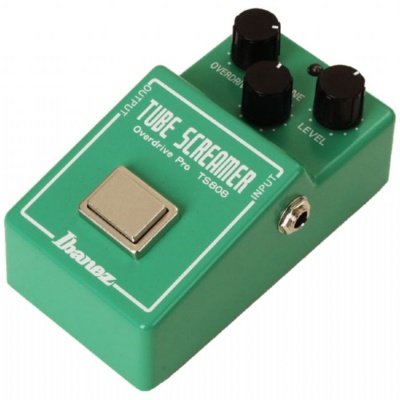Effect: Difference between revisions
Amwelladmin (talk | contribs) (Created page with "An effect is a, always, a noun. One may speak of the rainbow effect, or special effects,or, if one is a fan of the electric guitar, an effects pedal like Ibanez's lege...") |
Amwelladmin (talk | contribs) No edit summary |
||
| (21 intermediate revisions by the same user not shown) | |||
| Line 1: | Line 1: | ||
An [[effect]] is | {{a|plainenglish|[[File:Ibanez-ts808-vintage-tube-screamer.jpg|thumb|center|400px|The original TS-808 [[Tube Screamer]] - everything you need for that fat, creamy, crying tone.]]}} | ||
An [[effect]] is, ''always'', a [[noun]]. One may speak of the '''rainbow effect''', '''special effects''' or, if one is a fan of the [[electric guitar]], an '''effects pedal''' like Ibanez’s [[Tube Screamer]]<ref>{{google|tube-screamer}}.</ref> or Jim Dunlop’s [[Cry-Baby Wah-Wah]]<ref>{{google|Jim_Dunlop_Cry-Baby}}.</ref>. | |||
Put those two puppies together: now ''that’s'' an “[[effect]]”. This is to say: the only place for “effects” is in front of a guitar amp, and even then you should stomp on the damn things. | |||
One must ''not'' use [[effect]] as a {{tag|verb}}, even as a space-filler, however clamorously your inner [[Mediocre lawyer|articled clerk]] implores you to. “Effect” is the weakest {{tag|verb}} in the English language. Whatever you are intending to “[[effect]]” is almost certain to be a [[nominalisation]] of a stronger, better [[verb]]; one better suited to the task you have in mind. | |||
{{plain|effect the conversion of shares|convert the shares}} | {{plain|effect the conversion of shares|convert the shares}} | ||
{{plain|effect the delivey of a notice|deliver a notice}} | {{plain|effect the delivey of a notice|deliver a notice}} | ||
Why say “effect the butchery of a perfectly good sentence” when you mean - | |||
Well, you get the point. | |||
{{sa}} | |||
*[[Nominalisation]] | |||
*[[Noun]]s and [[verb]]s in their proper place. | |||
{{ref}} | |||
Latest revision as of 16:37, 3 July 2020
|
Towards more picturesque speech™
 The original TS-808 Tube Screamer - everything you need for that fat, creamy, crying tone.
|
An effect is, always, a noun. One may speak of the rainbow effect, special effects or, if one is a fan of the electric guitar, an effects pedal like Ibanez’s Tube Screamer[1] or Jim Dunlop’s Cry-Baby Wah-Wah[2].
Put those two puppies together: now that’s an “effect”. This is to say: the only place for “effects” is in front of a guitar amp, and even then you should stomp on the damn things.
One must not use effect as a verb, even as a space-filler, however clamorously your inner articled clerk implores you to. “Effect” is the weakest verb in the English language. Whatever you are intending to “effect” is almost certain to be a nominalisation of a stronger, better verb; one better suited to the task you have in mind.
Why say “effect the conversion of shares” when you mean “convert the shares”?
Why say “effect the delivey of a notice” when you mean “deliver a notice”?
Why say “effect the butchery of a perfectly good sentence” when you mean -
Well, you get the point.
See also
- Nominalisation
- Nouns and verbs in their proper place.